ABA Law Practice Today — Marketing Your Practice in 60 Minutes or Less
 In serving as an issue editor for the Marketing-themed March 2023 edition of the American Bar Association’s Law Practice Today webzine, together with my co-issue editor Jason Marsh, we tried to put together a collection of articles that would prove both timely and informative.
In serving as an issue editor for the Marketing-themed March 2023 edition of the American Bar Association’s Law Practice Today webzine, together with my co-issue editor Jason Marsh, we tried to put together a collection of articles that would prove both timely and informative.
My article contribution, Marketing Your Practice in 60 Minutes or Less, is not rocket science. But people read this stuff (click bait? Perhaps?). And it is designed more to encourage doing something, rather than simply doing nothing. Sometimes I too should follow my own advice. We’re all busy. But if we can just carve out a little time for business development each week, we’ll be the better for it. My wife keeps asking me when I’m going to get around to updating my own website and writing some fresh content. Soon. Soon. Maybe I should do it one hour at a time.
Paula Zirinsky writes on Marketing Opportunities in a Slow Market. And there is nothing more timely than Abbey Block of the Ifrah Law Firm in Washington, DC, writing on Can My Lawyer Be a Robot? We’re reading about issues surrounding artificial intelligence every day now, and the impact that it has, and will have, on the legal profession. Addressing some similar themes but from a total different angle—law marketing and AI—is Chat GPT, Your AI Friend in Content Marketing? For Lawyers, It Depends, by Marina Wilson of Justia.




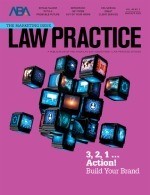 In my March/April 2023 marketing column in the American Bar Association’s Law Practice Magazine, I address the pros and cons of organizational involvement in
In my March/April 2023 marketing column in the American Bar Association’s Law Practice Magazine, I address the pros and cons of organizational involvement in 
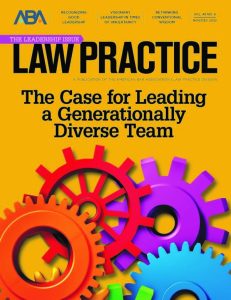
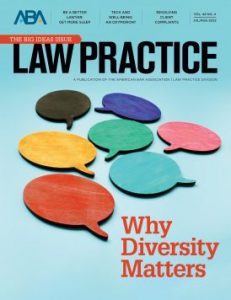 The last few years of recruiting and hiring marketing staff for law firms has certainly been interesting. On the plus side, law firms continue to invest in marketing and business development personnel. Some might argue that it is even more important as we come out of COVID and start to connect and reconnect with clients, prospective clients, and referral sources. The law firms that have
The last few years of recruiting and hiring marketing staff for law firms has certainly been interesting. On the plus side, law firms continue to invest in marketing and business development personnel. Some might argue that it is even more important as we come out of COVID and start to connect and reconnect with clients, prospective clients, and referral sources. The law firms that have 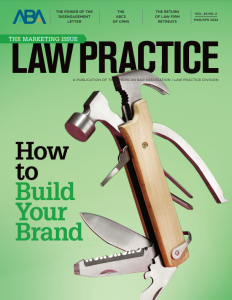 In that brief time snugly between delta and omicron, I had the opportunity to speak at a law firm retreat. Live. In-Person. With people. No masks. In a hotel. Food served. It was circa 2019 and it was so nice to put on a suit and close the Zoom app. In the March/April 2022 issue of Law Practice, I discuss
In that brief time snugly between delta and omicron, I had the opportunity to speak at a law firm retreat. Live. In-Person. With people. No masks. In a hotel. Food served. It was circa 2019 and it was so nice to put on a suit and close the Zoom app. In the March/April 2022 issue of Law Practice, I discuss 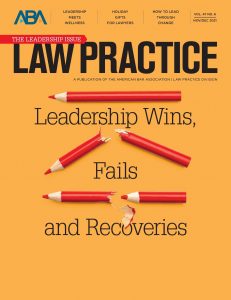 The third annual Up-Down Drill, which played off my favorite morning-after column in The Philadelphia Inquirer after an Eagles game (why did Jeff McLane stop doing it?), was one of the more difficult to write. In the November/December 2021 issue of Law Practice,
The third annual Up-Down Drill, which played off my favorite morning-after column in The Philadelphia Inquirer after an Eagles game (why did Jeff McLane stop doing it?), was one of the more difficult to write. In the November/December 2021 issue of Law Practice, 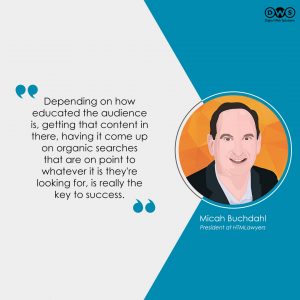
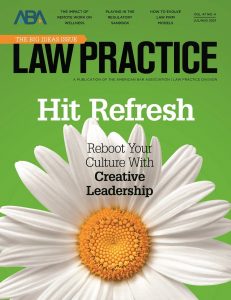 Yes, I went with the lowest hanging fruit of topics for my marketing column in the July/August 2021 issue of Law Practice,
Yes, I went with the lowest hanging fruit of topics for my marketing column in the July/August 2021 issue of Law Practice, 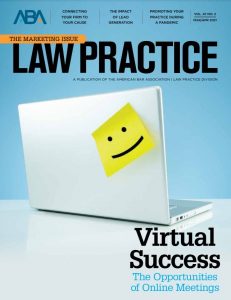 Earlier this week, I read an interesting article about how business travel will never fully return, because you can just go on Zoom, saving a ton of time and money. The story and premise all made sense until a quote at the end saying that the first time someone lost a sales pitch to a competitor that presented in-person—they’ll be right back on those airplanes. And I shook my head knowing that was so true.
Earlier this week, I read an interesting article about how business travel will never fully return, because you can just go on Zoom, saving a ton of time and money. The story and premise all made sense until a quote at the end saying that the first time someone lost a sales pitch to a competitor that presented in-person—they’ll be right back on those airplanes. And I shook my head knowing that was so true.